- Home
- Ernest Hemingway
The Old Man and the Sea Page 7
The Old Man and the Sea Read online
Page 7
But I must think, he thought. Because it is all I have left. That and baseball. I wonder how the great DiMaggio would have liked the way I hit him in the brain? It was no great thing, he thought. Any man could do it. But do you think my hands were as great a handicap as the bone spurs? I cannot know. I never had anything wrong with my heel except the time the sting ray stung it when I stepped on him when swimming and paralyzed the lower leg and made the unbearable pain.
"Think about something cheerful, old man," he said. "Every minute now you are closer to home. You sail lighter for the loss of forty pounds."
He knew quite well the pattern of what could happen when he reached the inner part of the current. But there was nothing to be done now.
"Yes there is," he said aloud. "I can lash my knife to the butt of one of the oars."
So he did that with the tiller under his arm and the sheet of the sail under his foot.
"Now," he said. "I am still an old man. But I am not unarmed."
The breeze was fresh now and he sailed on well. He watched only the forward part of the fish and some of his hope returned.
It is silly not to hope, he thought. Besides I believe it is a sin. Do not think about sin, he thought. There are enough problems now without sin. Also I have no understanding of it.
I have no understanding of it and I am not sure that I believe in it. Perhaps it was a sin to kill the fish. I suppose it was even though I did it to keep me alive and feed many people. But then everything is a sin. Do not think about sin. It is much too late for that and there are people who are paid to do it. Let them think about it. You were born to be a fisherman as the fish was born to be a fish. San Pedro was a fisherman as was the father of the great DiMaggio.
But he liked to think about all things that he was involved in and since there was nothing to read and he did not have a radio, he thought much and he kept on thinking about sin. You did not kill the fish only to keep alive and to sell for food, he thought. You killed him for pride and because you are a fisherman. You loved him when he was alive and you loved him after. If you love him, it is not a sin to kill him. Or is it more?
"You think too much, old man," he said aloud.
But you enjoyed killing the dentuso, he thought. He lives on the live fish as you do. He is not a scavenger nor just a moving appetite as some sharks are. He is beautiful and noble and knows no fear of anything.
"I killed him in self-defense," the old man said aloud. "And I killed him well."
Besides, he thought, everything kills everything else in some way. Fishing kills me exactly as it keeps me alive. The boy keeps me alive, he thought. I must not deceive myself too much.
He leaned over the side and pulled loose a piece of the meat of the fish where the shark had cut him. He chewed it and noted its quality and its good taste. It was firm and juicy, like meat, but it was not red. There was no stringiness in it and he knew that it would bring the highest price in the market. But there was no way to keep its scent out of the water and the old man knew that a very bad time was coming.
The breeze was steady. It had backed a little further into the north-east and he knew that meant that it would not fall off. The old man looked ahead of him but he could see no sails nor could he see the hull nor the smoke of any ship. There were only the flying fish that went up from his bow sailing away to either side and the yellow patches of Gulf weed. He could not even see a bird.
He had sailed for two hours, resting in the stern and sometimes chewing a bit of the meat from the marlin, trying to rest and to be strong, when he saw the first of the two sharks.
"Ay," he said aloud. There is no translation for this word and perhaps it is just a noise such as a man might make, involuntarily, feeling the nail go through his hands and into the wood.
"Galanos," he said aloud. He had seen the second fin now coming up behind the first and had identified them as shovelnosed sharks by the brown, triangular fin and the sweeping movements of the tail. They had the scent and were excited and in the stupidity of their great hunger they were losing and finding the scent in their excitement. But they were closing all the time.
The old man made the sheet fast and jammed the tiller. Then he took up the oar with the knife lashed to it. He lifted it as lightly as he could because his hands rebelled at the pain. Then he opened and closed them on it lightly to loosen them. He closed them firmly so they would take the pain now and would not flinch and watched the sharks come. He could see their wide, flattened, shovel-pointed heads now and their white-tipped wide pectoral fins. They were hateful sharks, bad smelling, scavengers as well as killers, and when they were hungry they would bite at an oar or the rudder of a boat. It was these sharks that would cut the turtles' legs and flippers off when the turtles were asleep on the surface, and they would hit a man in the water, if they were hungry, even if the man had no smell of fish blood nor of fish slime on him.
"Ay," the old man said. "Galanos. Come on galanos."
They came. But they did not come as the Mako had come. One turned and went out of sight under the skiff and the old man could feel the skiff shake as he jerked and pulled on the fish. The other watched the old man with his slitted yellow eyes and then came in fast with his half circle of jaws wide to hit the fish where he had already been bitten. The line showed clearly on the top of his brown head and back where the brain joined the spinal cord and the old man drove the knife on the oar into the juncture, withdrew it, and drove it in again into the shark's yellow cat-like eyes. The shark let go of the fish and slid down, swallowing what he had taken as he died.
The skiff was still shaking with the destruction the other shark was doing to the fish and the old man let go the sheet so that the skiff would swing broadside and bring the shark out from under. When he saw the shark he leaned over the side and punched at him. He hit only meat and the hide was set hard and he barely got the knife in. The blow hurt not only his hands but his shoulder too. But the shark came up fast with his head out and the old man hit him squarely in the center of his flat-topped head as his nose came out of water and lay against the fish. The old man withdrew the blade and punched the shark exactly in the same spot again. He still hung to the fish with his jaws hooked and the old man stabbed him in his left eye. The shark still hung there.
"No?" the old man said and he drove the blade between the vertebrae and the brain. It was an easy shot now and he felt the cartilage sever. The old man reversed the oar and put the blade between the shark's jaws to open them. He twisted the blade and as the shark slid loose he said, "Go on, galano. Slide down a mile deep. Go see your friend, or maybe it's your mother."
The old man wiped the blade of his knife and laid down the oar. Then he found the sheet and the sail filled and he brought the skiff onto her course.
"They must have taken a quarter of him and of the best meat," he said aloud. "I wish it were a dream and that I had never hooked him. I'm sorry about it, fish. It makes everything wrong." He stopped and he did not want to look at the fish now. Drained of blood and awash he looked the colour of the silver backing of a mirror and his stripes still showed.
"I shouldn't have gone out so far, fish," he said. "Neither for you nor for me. I'm sorry, fish."
Now, he said to himself. Look to the lashing on the knife and see if it has been cut. Then get your hand in order because there still is more to come.
"I wish I had a stone for the knife," the old man said after he had checked the lashing on the oar butt. "I should have brought a stone." You should have brought many things, he thought. But you did not bring them, old man. Now is no time to think of what you do not have. Think of what you can do with what there is.
"You give me much good counsel," he said aloud. "I'm tired of it."
He held the tiller under his arm and soaked both his hands in the water as the skiff drove forward.
"God knows how much that last one took," he said. "But she's much lighter now." He did not want to think of the mutilated under-side of the fish. He knew that each of
the jerking bumps of the shark had been meat torn away and that the fish now made a trail for all sharks as wide as a highway through the sea.
He was a fish to keep a man all winter, he thought. Don't think of that. Just rest and try to get your hands in shape to defend what is left of him. The blood smell from my hands means nothing now with all that scent in the water. Besides they do not bleed much. There is nothing cut that means anything. The bleeding may keep the left from cramping.
What can I think of now? he thought. Nothing. I must think of nothing and wait for the next ones. I wish it had really been a dream, he thought. But who knows? It might have turned out well.
The next shark that came was a single shovelnose. He came like a pig to the trough if a pig had a mouth so wide that you could put your head in it. The old man let him hit the fish and then drove the knife on the oar down into his brain. But the shark jerked backwards as he rolled and the knife blade snapped.
The old man settled himself to steer. He did not even watch the big shark sinking slowly in the water, showing first life-size, then small, then tiny. That always fascinated the old man. But he did not even watch it now.
"I have the gaff now," he said. "But it will do no good. I have the two oars and the tiller and the short club."
Now they have beaten me, he thought. I am too old to club sharks to death. But I will try it as long as I have the oars and the short club and the tiller.
He put his hands in the water again to soak them. It was getting late in the afternoon and he saw nothing but the sea and the sky. There was more wind in the sky than there had been, and soon he hoped that he would see land.
"You're tired, old man," he said. "You're tired inside."
The sharks did not hit him again until just before sunset.
The old man saw the brown fins coming along the wide trail the fish must make in the water. They were not even quartering on the scent. They were headed straight for the skiff swimming side by side.
He jammed the tiller, made the sheet fast and reached under the stern for the club. It was an oar handle from a broken oar sawed off to about two and a half feet in length. He could only use it effectively with one hand because of the grip of the handle and he took good hold of it with his right hand, flexing his hand on it, as he watched the sharks come. They were both galanos.
I must let the first one get a good hold and hit him on the point of the nose or straight across the top of the head, he thought.
The two sharks closed together and as he saw the one nearest him open his jaws and sink them into the silver side of the fish, he raised the club high and brought it down heavy and slamming onto the top of the shark's broad head. He felt the rubbery solidity as the club came down. But he felt the rigidity of bone too and he struck the shark once more hard across the point of the nose as he slid down from the fish.
The other shark had been in and out and now came in again with his jaws wide. The old man could see pieces of the meat of the fish spilling white from the corner of his jaws as he bumped the fish and closed his jaws. He swung at him and hit only the head and the shark looked at him and wrenched the meat loose. The old man swung the club down on him again as he slipped away to swallow and hit only the heavy solid rubberiness.
"Come on, galano," the old man said. "Come in again."
The shark came in a rush and the old man hit him as he shut his jaws. He hit him solidly and from as high up as he could raise the club. This time he felt the bone at the base of the brain and he hit him again in the same place while the shark tore the meat loose sluggishly and slid down from the fish.
The old man watched for him to come again but neither shark showed. Then he saw one on the surface swimming in circles. He did not see the fin of the other.
I could not expect to kill them, he thought. I could have in my time. But I have hurt them both badly and neither one can feel very good. If I could have used a bat with two hands I could have killed the first one surely. Even now, he thought.
He did not want to look at the fish. He knew that half of him had been destroyed. The sun had gone down while he had been in the fight with the sharks.
"It will be dark soon," he said. "Then I should see the glow of Havana. If I am too far to the eastward I will see the lights of one of the new beaches."
I cannot be too far out now, he thought. I hope no one has been too worried. There is only the boy to worry, of course. But I am sure he would have confidence. Many of the older fishermen will worry. Many others too, he thought. I live in a good town.
He could not talk to the fish anymore because the fish had been ruined too badly. Then something came into his head.
"Half fish," he said. "Fish that you were. I am sorry that I went too far out. I ruined us both. But we have killed many sharks, you and I, and ruined many others. How many did you ever kill, old fish? You do not have that spear on your head for nothing."
He liked to think of the fish and what he could do to a shark if he were swimming free. I should have chopped the bill off to fight them with, he thought. But there was no hatchet and then there was no knife.
But if I had, and could have lashed it to an oar butt, what a weapon. Then we might have fought them together. What will you do now if they come in the night? What can you do?
"Fight them," he said. "I'll fight them until I die."
But in the dark now and no glow showing and no lights and only the wind and the steady pull of the sail he felt that perhaps he was already dead. He put his two hands together and felt the palms. They were not dead and he could bring the pain of life by simply opening and closing them. He leaned his back against the stern and knew he was not dead. His shoulders told him.
I have all those prayers I promised if I caught the fish, he thought. But I am too tired to say them now. I better get the sack and put it over my shoulders.
He lay in the stern and steered and watched for the glow to come in the sky. I have half of him, he thought. Maybe I'll have the luck to bring the forward half in. I should have some luck. No, he said. You violated your luck when you went too far outside.
"Don't be silly," he said aloud. "And keep awake and steer. You may have much luck yet.
"I'd like to buy some if there's any place they sell it," he said.
What could I buy it with? he asked himself. Could I buy it with a lost harpoon and a broken knife and two bad hands?
"You might," he said. "You tried to buy it with eighty-four days at sea. They nearly sold it to you too."
I must not think nonsense, he thought. Luck is a thing that comes in many forms and who can recognize her? I would take some though in any form and pay what they asked. I wish I could see the glow from the lights, he thought. I wish too many things. But that is the thing I wish for now. He tried to settle more comfortably to steer and from his pain he knew he was not dead.
He saw the reflected glare of the lights of the city at what must have been around ten o'clock at night. They were only perceptible at first as the light is in the sky before the moon rises. Then they were steady to see across the ocean which was rough now with the increasing breeze. He steered inside of the glow and he thought that now, soon, he must hit the edge of the stream.
Now it is over, he thought. They will probably hit me again. But what can a man do against them in the dark without a weapon?
He was stiff and sore now and his wounds and all of the strained parts of his body hurt with the cold of the night. I hope I do not have to fight again, he thought. I hope so much I do not have to fight again.
But by midnight he fought and this time he knew the fight was useless. They came in a pack and he could only see the lines in the water that their fins made and their phosphorescence as they threw themselves on the fish. He clubbed at heads and heard the jaws chop and the shaking of the skiff as they took hold below. He clubbed desperately at what he could only feel and hear and he felt something seize the club and it was gone.
He jerked the tiller free from the rudder and beat an
d chopped with it, holding it in both hands and driving it down again and again. But they were up to the bow now and driving in one after the other and together, tearing off the pieces of meat that showed glowing below the sea as they turned to come once more.
One came, finally, against the head itself and he knew that it was over. He swung the tiller across the shark's head where the jaws were caught in the heaviness of the fish's head which would not tear. He swung it once and twice and again. He heard the tiller break and he lunged at the shark with the splintered butt. He felt it go in and knowing it was sharp he drove it in again. The shark let go and rolled away. That was the last shark of the pack that came. There was nothing more for them to eat.
The old man could hardly breathe now and he felt a strange taste in his mouth. It was coppery and sweet and he was afraid of it for a moment. But there was not much of it.
He spat into the ocean and said, "Eat that, galanos. And make a dream you've killed a man."
He knew he was beaten now finally and without remedy and he went back to the stern and found the jagged end of the tiller would fit in the slot of the rudder well enough for him to steer. He settled the sack around his shoulders and put the skiff on her course. He sailed lightly now and he had no thoughts nor any feelings of any kind. He was past everything now and he sailed the skiff to make his home port as well and as intelligently as he could. In the night sharks hit the carcass as someone might pick up crumbs from the table. The old man paid no attention to them and did not pay any attention to anything except steering. He only noticed how lightly and how well the skiff sailed now there was no great weight beside her.
She's good, he thought. She is sound and not harmed in any way except for the tiller. That is easily replaced.
He could feel he was inside the current now and he could see the lights of the beach colonies along the shore. He knew where he was now and it was nothing to get home.
The wind is our friend, anyway, he thought. Then he added, sometimes. And the great sea with our friends and our enemies. And bed, he thought. Bed is my friend. Just bed, he thought. Bed will be a great thing. It is easy when you are beaten, he thought. I never knew how easy it was. And what beat you, he thought.

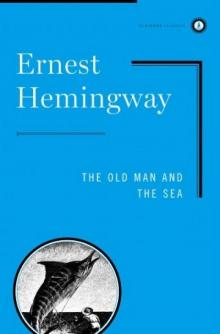 The Old Man and the Sea
The Old Man and the Sea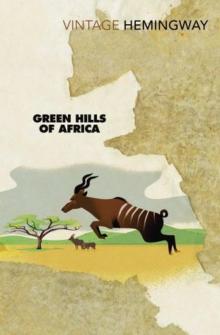 Green Hills of Africa
Green Hills of Africa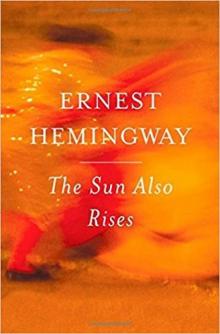 The Sun Also Rises
The Sun Also Rises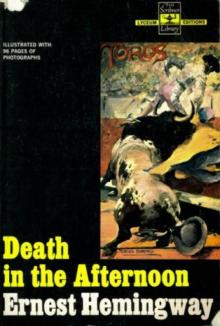 Death in the Afternoon
Death in the Afternoon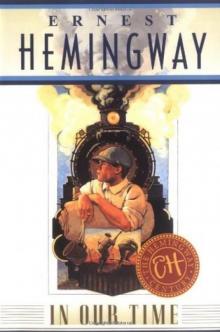 In Our Time
In Our Time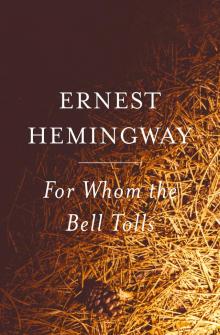 For Whom the Bell Tolls
For Whom the Bell Tolls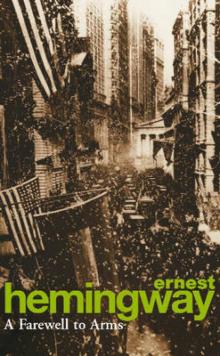 A Farewell to Arms
A Farewell to Arms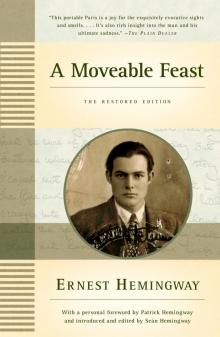 A Moveable Feast
A Moveable Feast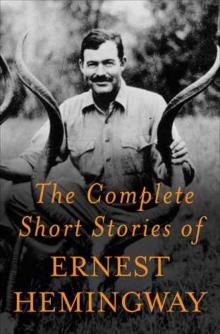 The Complete Short Stories of Ernest Hemingway
The Complete Short Stories of Ernest Hemingway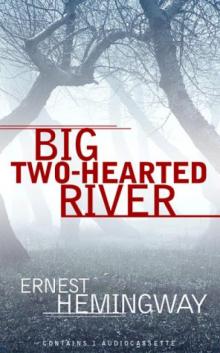 Big Two-Hearted River
Big Two-Hearted River Winner Take Nothing
Winner Take Nothing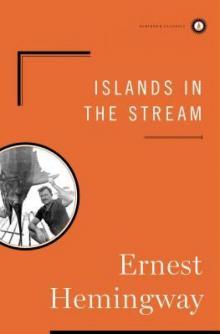 Islands in the Stream
Islands in the Stream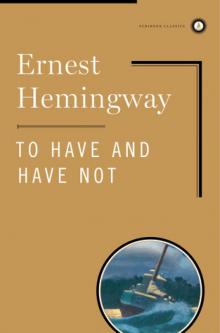 To Have and Have Not
To Have and Have Not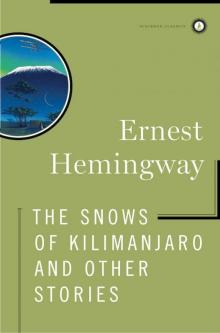 The Snows of Kilimanjaro and Other Stories
The Snows of Kilimanjaro and Other Stories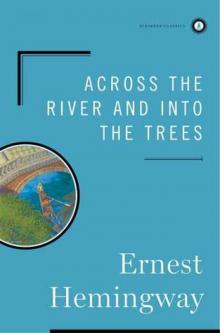 Across the River and Into the Trees
Across the River and Into the Trees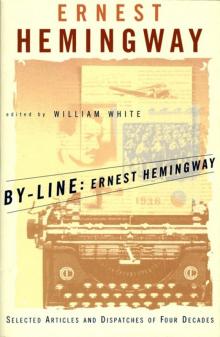 By-Line Ernest Hemingway
By-Line Ernest Hemingway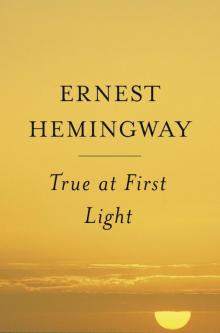 True at First Light
True at First Light Men Without Women
Men Without Women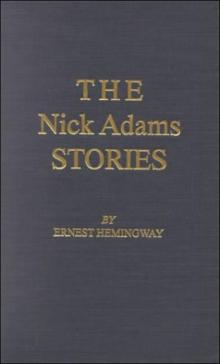 The Nick Adams Stories
The Nick Adams Stories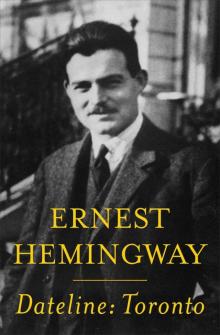 Dateline- Toronto
Dateline- Toronto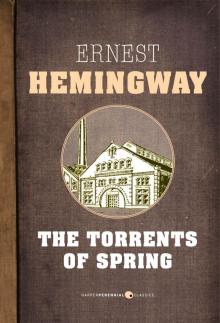 The Torrents of Spring
The Torrents of Spring Short Stories
Short Stories